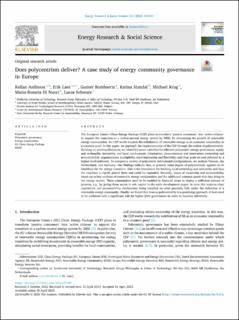Does polycentrism deliver? A case study of energy community governance in Europe
Anfinson, Kellan; Laes, Erik; Bombaerts, Gunter; Standal, Karina; Krug, Michael; Di Nucci, Maria-Rosaria; Schwarz, Lucas
Peer reviewed, Journal article
Published version

Åpne
Permanent lenke
https://hdl.handle.net/11250/3119299Utgivelsesdato
2023Metadata
Vis full innførselSamlinger
- Journal articles [478]
Sammendrag
The European Union's Clean Energy Package (CEP) plans to transform ‘passive consumers’ into ‘active citizens’ to support the transition to a carbon-neutral energy system by 2050. By stimulating the growth of renewable energy communities, the CEP works towards the redefinition of renewable energy as an economic commodity to a common good. In this paper, we approach the implementation of the CEP through the notion of polycentricity. Building on previous literature, we identified seven variables for effective polycentric energy governance: equity and co-benefits; inclusivity and local involvement; information, demonstration and innovation; ownership and accountability; organizational multiplicity; experimentation and flexibility; and clear goals set and enforced by a higher-level authority. To compare a variety of polycentric institutional configurations, we analyze Norway, the Netherlands, and Germany. Our findings indicate that, in general, some degree of polycentricity appears to be beneficial for the energy transition. This is the foundation for building local ownership and inclusivity and thus the emphasis is rightly placed there and could be expanded. Secondly, issues of ownership and accountability stand out as key enablers of renewable energy communities and the additional common goods that they bring to the energy system. These communities need to be enabled in financial terms to deploy a sufficient amount of projects, e.g., by giving them access to risk capital in the early development stages. In turn, this requires clear regulations and accountability mechanisms being installed on what precisely falls under the definition of a renewable energy community. Finally, we found that even as polycentricity is a promising approach, it does need to be anchored with a significant role for higher level government in order to function effectively.
